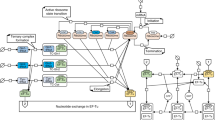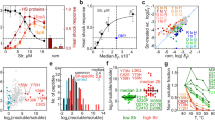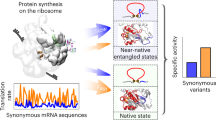Abstract
THE passage of genetic information from gene to polypeptide does not proceed with perfect fidelity1–3, but it is not known what short and long-term cellular responses may be induced by decreases in the accuracy of protein synthesis. Errors in gene expression may tend to increase their own rate of production4, and thus could constitute a limiting instability of cellular life. The synthesis of inaccurate RNA, RNA polymerases, tRNAs, tRNA modifying enzymes, tRNA charging enzymes and ribosomal proteins are potential pathways for the perpetuation or amplification of errors. Such errors may be inducible in vivo by external chemical agents and may constitute an indirect pathway for mutagenesis5–8. An enhanced rate of such errors may be the mechanism by which certain deleterious mutations exert their effects. Here we report the results of experiments with Escherichia coli designed to detect evidence of self amplification of errors in protein synthesis. If such error feedback is quantitatively significant, a slight increase in the pre-existing error rate should be followed by a progressive decrease in the accuracy of protein synthesis. While this process could lead to a new stable level and thus need not precipitate a catastrophic breakdown, some late effects should be observable if the mechanisms are at all as hypothesised.
This is a preview of subscription content, access via your institution
Access options
Subscribe to this journal
Receive 51 print issues and online access
$199.00 per year
only $3.90 per issue
Buy this article
- Purchase on Springer Link
- Instant access to full article PDF
Prices may be subject to local taxes which are calculated during checkout
Similar content being viewed by others
References
Loftfield, R. B., Biochem. J., 89, 82–92 (1963).
Loftfield, R. B., and Vanderjagt, D., Biochem. J., 128, 1353–1356 (1972).
Davies, J., Prog. molec. subcell. Biol., 1, 47–81 (1969).
Orgel, L. E., Proc. natn. Acad. Sci. U.S.A., 49, 517–521 (1963); 67, 1476 (1970).
Speyer, J. F., Karam, J. D., and Lenny, A. B., Cold Spring Harb. Symp. quant. Biol., 31, 693–697 (1966).
Lewis, C. M., and Holliday, R., Nature, 228, 877–880 (1970).
Lewis, C. M., and Tarrant, G. M., Mutation Res., 12, 349–356 (1971).
Talmud, P., and Lewis, D., Nature, 249, 563–564 (1974).
Gorini, L., and Davies, J., Current Topics Microbiol. Immun., 44, 100–122 (1968).
Miller, J. H., in Experiments in Molecular Genetics, 432–433 (Cold Spring Harbor Laboratory, 1972).
Revel, H. R., Luria, S. E., and Rotman, B., Proc. natn. Acad. Sci. U.S.A., 47, 1956–1967 (1961).
Kepes, A., and Bequin, S., Biochim. biophys. Acta, 123, 546–560 (1966).
Leive, L., Proc. natn. Acad. Sci. U.S.A., 53, 745–750 (1965).
Author information
Authors and Affiliations
Rights and permissions
About this article
Cite this article
BRANSCOMB, E., GALAS, D. Progressive decrease in protein synthesis accuracy induced by streptomycin in Escherichia coli. Nature 254, 161–163 (1975). https://doi.org/10.1038/254161a0
Received:
Revised:
Issue Date:
DOI: https://doi.org/10.1038/254161a0
This article is cited by
-
Low level genome mistranslations deregulate the transcriptome and translatome and generate proteotoxic stress in yeast
BMC Biology (2012)
-
Streptomycin, Errors in Mitochondria and Ageing
Biogerontology (2005)
-
A novel form of suppression due to an altered RNA polymerase
Molecular and General Genetics MGG (1981)
-
Natural premature protein synthesis termination can be reduced in Escherichia coli by decreased translation rates
Molecular and General Genetics MGG (1979)
-
The error catastrophe hypothesis and aging
Journal of Mathematical Biology (1976)
Comments
By submitting a comment you agree to abide by our Terms and Community Guidelines. If you find something abusive or that does not comply with our terms or guidelines please flag it as inappropriate.



